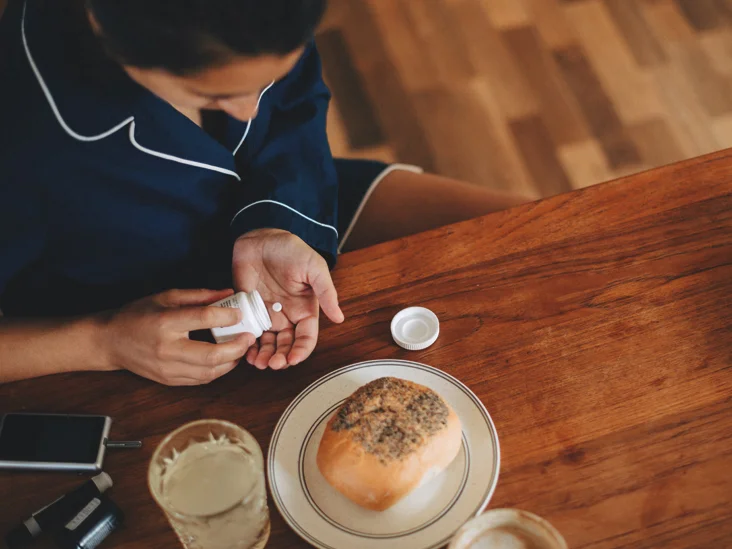Can You Take Ibuprofen With Coffee?
It’s a question many of us have asked ourselves. The answer is yes, combining ibuprofen and caffeine can provide more effective pain relief than ibuprofen alone. However, there is an increased risk of side effects that need to be carefully considered before opting for this combination.
Research has demonstrated the analgesic properties of pairing ibuprofen and sources of caffeine for the treatment of acute pain. But when it comes to tension-type headaches, studies are more limited, as approaches for analyzing this type of headache pain can not totally cover the condition.
A recent study was undertaken to assess the efficacy of taking ibuprofen plus caffeine in treating such pains and to develop a more sensitive methodology to compare its effects against those brought about by either agent alone.
What Is Caffeine Withdrawal Headache?
Caffeine withdrawal headaches are experienced when an individual with regular caffeine consumption drastically reduces or stops their intake of it. Caffeine prevents the brain’s adenosine receptors from functioning as pain modulators.
Common signs of the headache usually include a dull, throbbing sensation in the head that can last anywhere from a few hours up to a few days.

In order to make caffeine withdrawal symptoms better, people often consume more caffeine which helps alleviate the pain associated with the headache. However, there are other home and over-the-counter remedies that can be used as well such as ibuprofen or acetaminophen to reduce any discomfort associated with the headache.
It’s important to note that these methods may not work for everyone and should only be attempted under the guidance of a healthcare professional.
6 Tips For Relief
Below are some tips that can help alleviate headache discomfort:
1. Use A Nonprescription (OTC) Pain Reliever
When it comes to easing a caffeine withdrawal headache, as well as other headaches, one of the best solutions is to take a nonprescription (OTC) pain reliever like acetaminophen (Tylenol), ibuprofen (Advil, Midol), or aspirin (Bayer, Bufferin).
These medications should be taken once every four to six hours until your pain subsides. You may also opt for a pain reliever that includes drinks with caffeine dependency which makes these drugs 40 percent more effective and helps your body absorb the medication more quickly.
However, limit the use of these medications up to twice a week since taking them too often can lead to rebound headaches. Make sure to check with your doctor about their advice for specific dosages for optimum relief when using OTC pain relievers.
2. Apply Peppermint Oil Topically
Applying peppermint oil topically could be the key to getting relief from headaches. The active ingredient, menthol, has been proven to reduce inflammation and relax tight muscles that can contribute to head pain. A recent study even suggests that using this oil might have comparable effects to acetaminophen.
If you’re looking for natural headache relief, try massaging two or three drops of peppermint oil directly into your forehead or temples. You don’t need to dilute it with carrier oil before applying, although an additional layer of coconut oil could help make the application more comfortable.
3. Work On Your Pressure Points
When it comes to safe, effective relief from headaches and other body pains, working on your pressure points can be an effective method. These acupoints or pressure points are located all around the body, and pressing or massaging them can help reduce tension in muscles.
A study conducted in 2010 found that regularly practicing acupressure for a month helped relieve chronic headaches better than muscle relaxants. Additionally, it has been found to be helpful for sciatica pain, lower back pain, and joint stiffness.
So if you’re feeling any of these symptoms of caffeine withdrawal and want relief without taking pain or sleep medication or coffee, work on your pressure points! They are natural sources of healing that require no chemicals or stimulants—just regular practice.
One point that is linked to headaches is found between the base of your thumb and index finger. Taking five minutes to press firmly on this spot could reduce the pain you are experiencing. This technique should be repeated on both hands for the best results.
It’s an easy and natural solution that doesn’t require any tablets or medications, so you don’t have to worry about taking ibuprofen with cups of coffee or anything else.
Plus, since you’re relying on your body’s own energy and tension, you won’t expose yourself to any unwanted side effects even if you use it every day.
4. Use An Ice Pack
Using an ice pack is one of the best remedies for migraine pain. Applying an ice pack to your head can not only diminish the headache, but it can also slow down the blood flow in blood vessels, thus numbing the affected area. It’s even been shown in small studies that placing a cold pack over the carotid artery in people’s necks was enough to decrease their migraine pain significantly!
So if you suffer from migraines, keep an ice pack nearby and apply it whenever you start to feel some pain. The soothing cold should be just what you need to help alleviate your migraine symptoms – without having to take any medication whatsoever.
5. Stay Hydrated
If you’re a frequent coffee drinker and get headaches, one of the best things you can do to alleviate discomfort is to stay hydrated. Regular caffeine intake increases water loss when you urinate, so if there isn’t enough fluid in your body, it may cause your brain to shrink in volume.
That’s why it’s important to replace lost fluids with extra drink consumption throughout the day–water is better than anything else! This not only reduces the risk of headache onset but can also help ease existing headache pain and abdominal pain as well. Staying hydrated keeps you healthy both mentally and physically; so make sure that you’re drinking plenty of fluids each day.
Headaches can be caused by the brain shrinking away from the skull, as this stimulates pain receptors in the protective membrane around it. That’s why it’s important to drink 8 glasses of water every day.
Not only will drinking the right amount of water help ease headache discomfort, but it will also keep you healthy by helping to flush out toxins, regulate body temperature and metabolism, and aid in digestion. So make sure you stay hydrated.
6. Quench Your Caffeine Thirst
When you need relief from the spread of pain, it’s hard to resist the urge to quench your caffeine craving for a quick fix. While this might provide some temporary relief, it may lead to dependence on the stimulant.
That’s why it’s important to find other ways of relieving your symptoms before resorting to having some milligrams of caffeine-filled beverages. If you appreciate the taste of coffee, opt for decaffeinated instead. But if, after trying all other measures first and nothing is providing any relief, then you can satisfy your craving.
Just be aware that it can become habit-forming, so moderation is key and as soon as you start feeling better, try to reduce your caffeine dependence or give up caffeine altogether in order to break the cycle. Caffeine reduction can lead to a rebound effect that causes a boost in blood flow.
